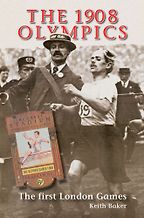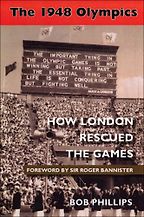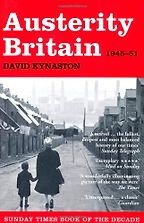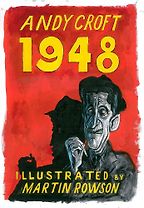Today London becomes the first city to stage the Olympics for a third time in the modern era, having hosted it in 1908 and 1948. I’ve been looking at all three London Olympics and trying to find some common characteristics. I suppose, on the surface, you could argue that they are all pretty non-political compared with others. Would that be right?
It’s true that certain Games leap out at people when they think about politics spoiling the Olympics – I’m thinking in particular of Berlin in 1936 and Munich in 1972. The London ones by comparison seem very tame because nothing bad happened in the previous two. In 2012 we’ll just have to see, but the hope is that nothing bad will happen this time either. But if you look at how the 1908 and 1948 games played out, they were both very political in different ways. It’s a mistake to think that you have a few political Olympics and then the rest are these nice, tame, sporting celebrations – all Olympic Games are political.
Why is that? Is it because it is a global platform for political grievances to come to the surface?
There are lots of different ways Olympic Games can be politicised. Obviously one of them is for people to react to the idea that they’re this nice celebration of international solidarity and sporting co-operation and use that as a backdrop for a political act. But, more commonly, it’s just the case that they’re not a nice celebration of international solidarity. Any gathering on this scale will always be shot through with rivalries and political tensions. Sport is not going to make these things go away – sometimes it accentuates them. That was certainly true in the 1908 London Games.
And 2012?
Well, we don’t know. There’s always a fear, particularly with the more recent Games because of their scale and vast global audience, that something will intervene to overshadow them. The fear this time has to be terrorism and vast amounts of time and money are being spent to try to prevent that happening.
The other feeling one gets from 2012, which makes it different from the previous London Games, is that it has been set up with blanket positive coverage. It has become this giant media event which has really been designed to smother politics, to overlay it with this celebration of sport. The hope is that in 2012 politics won’t break through – we’ll have to see. In 1908 and 1948 you could see the politics more clearly. With 2012 you feel that it’s an event that’s so massive that politics will just get squeezed out.
Looking again at the common characteristics of the three London Games, it could be said that they were all done on the cheap. The 1908 Games were given no public money and handed over to an entrepreneur. The 1948 Games cost the grand sum of £750,000, or £77m in today’s money. Estimates vary on the costs of London 2012, but it will be nothing like the £20bn spent on the Beijing Games.
It’s all relative. The 2012 Games are not the most expensive of the modern era, but they are a lot more expensive than 1948 and 1908, which really were cheap. This is particularly true of 1948, which were the “Austerity Olympics” both because of the condition of Britain at the time and the fact that no other country wanted to spend any money on them. Relative to that, London 2012 does feel like a pretty expensive event and, if you do the maths, in 1908 and 1948 the amount of money spent per athlete in modern money comes out roughly at £5,000 for each. In 2012, we’re talking at least 100 times that. So it’s just on a completely different scale.
The growth of the media, and television in particular, has transformed public engagement with the Olympics. In 1908 people would have had little idea what was going on in the London Games.
Even in 1908 news travelled pretty fast and newspaper coverage was widespread. But yes, you had to go along to see what was happening and actually not that many people did to start with – it was quite a low-key event in that respect. 1948 was important in the Olympic era because it was the first televised Games. Not many people had televisions, but the ones who did were desperate to watch and the BBC was amazed by how popular it was – they hadn’t been sure that anyone would want to watch.
Let’s turn to your book choices. First out of the blocks we have Keith Baker, who describes the 1908 Games as the first modern sporting event to pit nation against nation.
I didn’t know much about 1908 before I read it and what it showed me was just how much confrontation and political anger there was running through these Games. All of it was coming from the athletes – there were boycotts, there were falling outs, just all sorts of confrontation. When we think of the politicisation of the Olympics, we tend to think of terrorists and government interventions – we don’t think of the athletes involved. The athletes are unlikely to politicise London 2012 – if it happens it will come from the outside. In 1908 it was the athletes that fell out, notably the British and the American teams, over politics.
The American team refused to dip their flag to the monarch at the opening ceremony.
Yes, and they also fell out over the Irish question. The American team was predominantly Irish American and hated the way that Irish athletes were made to run under the British flag. They made gestures of protest right through the Games. It’s really hard to think of modern athletes falling out in that way. You also had athletes pulling out of events because they thought the other side was cheating. There was also a lot of fighting over the question of who were or were not amateurs.
British officials disliked the idea that American athletes might have actually trained for the Olympics, which they saw as contrary to the spirit of amateurism.
The British thought the Americans had essentially sent over a professional team. From the British perspective, American sport was contaminated by professionalism. The British thought sport at its highest level should be an amateur enterprise. It was almost as if the American way of life – the fact that Americans were thought to be professionalising everything – was a threat to a British understanding of not only sport, but of the way you did things generally.
The marathon came to epitomise the Anglo-American rivalry in the 1908 Games. The exhausted Italian Dorando Pietri came in first, but was denied a gold medal after the Americans complained that he had been assisted by British officials.
This is the image the 1908 Games are famous for – this little Italian guy being helped over the finishing line. People remember it because it’s an example of heroism – that anyone from anywhere can be an Olympic hero. But at the time, the key thing for the British newspapers and the public was that he wasn’t American. The British hated the idea that these Americans who had done all this training were going to win the marathon. So when the first person who entered the stadium wasn’t the American favourite but this little Italian guy, they were desperate for him to win. When he was disqualified, it was because the Americans complained that he had been helped. If the Americans were going to complain and get the gold medal that way, the British were determined to make Pietri a hero and he was given a special gilded silver cup.
But this was more than Anglo-American sporting rivalry. The 1908 Games have this innocence to them, like almost everything in that pre-World War I period. But one of the interesting things that people forget is that Britain and America were not on friendly terms at that time. People in Britain were wondering which country the next big war would be against – was it going to be Germany or America? This stuff wasn’t just a jokey falling out between friends – it was really political.
Only 22 countries competed in 1908, and just 24 sporting disciplines were contested. It was tiny. In 1948 you had 59 countries competing and in 2012 there will be more than 200.
The 1908 Games were small and pretty chaotic – it really wasn’t well organised. What people forget is that although the athletics took place over a short period, all the other events were dragged out over months all over the country. London 2012 has this extraordinarily concentrated feel to it. For the days that it runs, it will be the life of the nation and there will be no getting away from it. In 1908, a lot of people weren’t sure if it was on or not.
The Condition of England
is a survey of England in 1909, the year after the Olympics were held. Please tell us more.
This book is interesting for lots of reasons. It’s written by this concerned liberal politician trying to get to grips with his country, which, in lots of ways, frightens him. He tries to be hopeful for it but there are aspects of the modernisation of Britain he finds very alarming, and that is what gives this book a contemporary feel. Again, it’s very poignant because it’s pre-World War I, so a lot of its anxiety is about whether the British people have the qualities and the political institutions they’re going to need to survive and prosper in the 20th century.
I read it in the context of studying attitudes to sport and the Olympics. He doesn’t really say much about the Olympics as such, but he is really obsessed with sport. He’s obsessed with this fear about its professionalisation and the fact that sport had become this opium of the working classes, this escape from everyday life. One of the things that he’s worried about is spectators and particularly crowds – it was a period in which people were terrified by crowds, these unthinking masses that were beyond political control.
Is this similar to a fear of the mob?
There’s fear of the mob that is fear of revolution and riot. But the fear of the crowd in the early 20th century was different because what people were frightened of was their passivity. Sport was perceived to be creating passive crowds of gawping spectators getting cheap thrills who weren’t really engaged politically. Masterman is concerned that spectator sport was going to squeeze out democracy, as people would lose interest in it because they were too busy watching football. In some ways his fears were really overblown, but that’s what makes it such an interesting book.
So the 1908 Olympics in that context – its politicisation and the ways in which the British were really distrustful of the American professionalisation of sport – are Masterman’s fears too. He spoke for a certain British view of this, which is that if Britain went the way of America, it was going the way of these big sporting crowds and that’s not the Olympics way – the Olympic way is meant to be participation.
Now for The 1948 Olympics: How London Rescued the Games
.
I presume the subtitle of this book is a reference to what happened in the 1936 Berlin Games.
Yes. The Games that everyone remembers as the political Games were the Nazi ones in 1936 when Hitler turned them into a propaganda celebration. One of the unfortunate features of these Games is that, in a way, Hitler was celebrating some of the Olympic ideals, such as physical prowess, but then went on to twist them for his own political ends.
After World War II there was this real concern that the Olympic movement had to rescue itself from being exploited by politicians in this way. So the London Games were designed to be the polar opposite of what had taken place in 1936 – they were to be low key, non-political and friendly. This also meant really focusing on the sport, rather than the celebration of the human body.
Did the 1948 Games symbolise the decline of Britain as a world power? Japan, Germany and the Soviet Union were all absent from them, but Britain still came a lowly 12th in the medals table.
The general response to the results at the time was embarrassment and one of the real anxieties was that it was not just a reflection of Britain’s decline as a world power, but that the British people were malnourished, which in some respects they were. Never mind the 1908 complaints that the Americans had been training, now there was a sense that the British needed a bit more building up and training.
That said, there were other people who thought the British performance was perfectly fine, that it was very British and nothing like the Berlin Games, which were all about celebrating German success and prowess. Somehow it was all right if the British did badly, because that was part of the new rescued Games, which weren’t about jingoism and national bombast. There’s this great story that the British Olympic Minister Philip Noel-Baker liked to tell of someone who went to the Berlin Games, who said by the end of them he was absolutely sick of hearing Deutschland über alles being played everywhere, and the great thing about the London Games was that you hardly heard “God Save the Queen” at all because British athletes didn’t win.
The two new German states wanted to compete in London but were not invited by the International Olympic Committee. Stalin, however, just thought the 1948 Games weren’t worth participating in and no Soviet team was present.
He initially thought the Olympics were ridiculous, but then he noticed their propaganda value and decided to send a Soviet team to Helsinki 1952, where they did very well.
The 1948 Games were regarded as non-political, but politically there was so much going on in the world that year – growing tensions between the West and the Soviet bloc, the first Arab-Israeli War and partition in India.
It was probably the most politically dangerous year that any Olympics have ever taken place in. These were really fraught times. It was the beginning of the Cold War and the Berlin blockade was going on while the Games were taking place – an emergency debate in the House of Commons coincided with the opening ceremony. But the whole point of the 1948 London Olympics was to somehow be insulated from all of that. It was to present this “Keep Calm and Carry On” spirit. This is what it was meant to symbolise and it did it very successfully.
The 1948 Olympics were taking place in a country that was financially broke after the war. In 2012 Britain is an age of austerity, but looking at the Olympics today it’s hard to find any sign of it.
It’s worth reading this book just for the details about how austere the 1948 Games were. My favourite is that the British Olympic Association couldn’t afford to provide free towels, so the athletes had to rent them by the day. You just have to think about that in the context of 2012 – I would love to see the faces of the American team if they were told that they had to rent their towels in the Olympic village. There was just no money at all in 1948. In all sorts of different ways, what we call austerity now doesn’t compare with past austerities.
That links nicely to Austerity Britain by historian David Kynaston, which is a detailed survey of British life after World War II. Please tell us more.
This is a great book. It doesn’t actually have much to say about the Olympics and gives you a sense, in a way, that the 1948 Olympics wasn’t such a huge deal. It was an important symbolic event, but it didn’t have that all-consuming quality that it has now.
What this book does give you is a sense of what an incredibly dangerous and traumatic political time it was between 1945 and 1951 – the recovery from World War II, the birth of the Cold War and the break-up of empire. But at the same time it also gives you a sense of how little of that actually touched ordinary lives. Geopolitics flits in and out of people’s consciousness but it doesn’t consume it in the way you might think from reading about the lives of politicians. People don’t obsess about these things even when they’re living through what were extraordinarily dangerous times. Life goes on and the 1948 Olympics were very much in keeping with that way of thinking.
Please tell us more about your final pick.
This is a long satirical poem that has been recently published, obviously with an Olympic theme in mind. The backdrop is the 1948 Olympics. It’s an alternative universe in which Britain is on the Soviet side in the Cold War and the Americans are the ones boycotting the Games. It’s also a take on George Orwell’s 1984.
It’s a very amusing narrative poem and the story is not hard to follow. It has this nice conceit in it that one of the characters finds a 1984-style book written in 1948 imagining a dystopian future. This dystopian future, imagined in communist Britain in 1948, is of Britain as it is now – a corporate, free-market-world-gone-crazy Britain. Reading it did just slightly capture the feeling that I have which is though there is nothing particularly bad about the 2012 Games, and one wouldn’t want anything bad to happen during them, they do have this slightly dystopian feel to them – the blanket corporateness of it and the fact that they are being guarded by thousands of soldiers. Sure, you can’t be lax with security, but this event has acquired a sort of life of its own which means that almost everyone involved in it is operating to these imperatives over which no one seems to have any control – they have to defend the corporate sponsors, you have to bring the army in because you can’t risk anything going wrong. It just has that feel to it. This poem is just a nice juxtaposition of a more poetic universe in which the future we live in now is actually the dystopia.
One last question before we cross the finishing line. Barring a terrorist outrage, how do you think future historians will talk about London 2012?
It’s really hard to know. The really interesting political Games in a way, though nobody talks about them much, were Athens in 2004. Those Games, in a small way, helped to undermine the finances of the Greek state, which may still come to undermine the public finances of the world. But at the time no one had any idea that this was going on. If in 10 years’ time something catastrophic happens to the British or European economy – it probably won’t happen, but if it did – people would probably look back on these Games as an absurd folly. On the other hand, if they pass off successfully and the British economy turns a corner, people may look back at these Games as part of the turning point. But that’s assuming that nothing happens to overshadow them. If that happens, that is what they will be remembered for. Whatever else was going on at the time, Munich 1972 will always be remembered for terrorism. Let’s hope that doesn’t happen this time.
July 26, 2012. Updated: July 10, 2020
Five Books aims to keep its book recommendations and interviews up to date. If you are the interviewee and would like to update your choice of books (or even just what you say about them) please email us at [email protected]
Five Books interviews are expensive to produce. If you've enjoyed this interview, please support us by donating a small amount.










